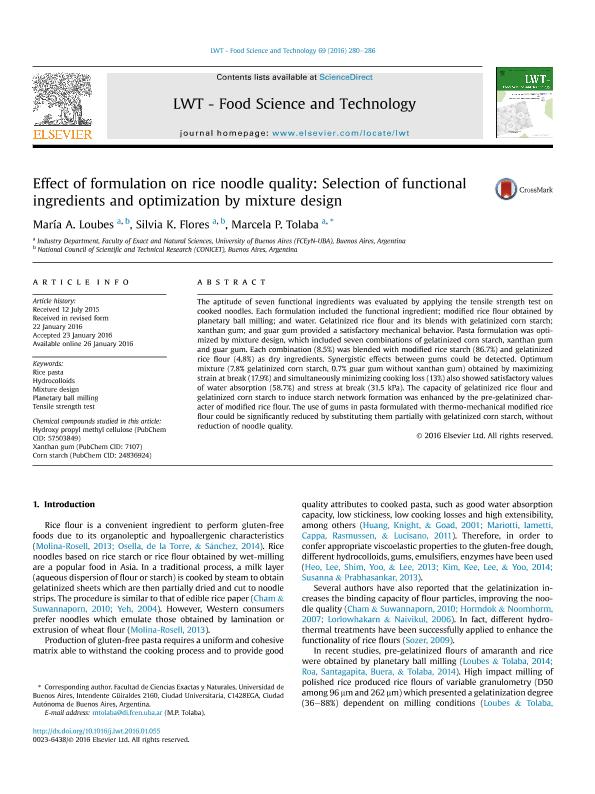Mostrar el registro sencillo del ítem
dc.contributor.author
Loubes, María Ana

dc.contributor.author
Flores, Silvia Karina

dc.contributor.author
Tolaba, Marcela Patricia

dc.date.available
2018-09-13T18:06:41Z
dc.date.issued
2016-06
dc.identifier.citation
Loubes, María Ana; Flores, Silvia Karina; Tolaba, Marcela Patricia; Effect of formulation on rice noodle quality: Selection of functional ingredients and optimization by mixture design; Elsevier Science; LWT - Food Science and Technology; 69; 6-2016; 280-286
dc.identifier.issn
0023-6438
dc.identifier.uri
http://hdl.handle.net/11336/59548
dc.description.abstract
The aptitude of seven functional ingredients was evaluated by applying the tensile strength test on cooked noodles. Each formulation included the functional ingredient; modified rice flour obtained by planetary ball milling; and water. Gelatinized rice flour and its blends with gelatinized corn starch; xanthan gum; and guar gum provided a satisfactory mechanical behavior. Pasta formulation was optimized by mixture design, which included seven combinations of gelatinized corn starch, xanthan gum and guar gum. Each combination (8.5%) was blended with modified rice starch (86.7%) and gelatinized rice flour (4.8%) as dry ingredients. Synergistic effects between gums could be detected. Optimum mixture (7.8% gelatinized corn starch, 0.7% guar gum without xanthan gum) obtained by maximizing strain at break (17.9%) and simultaneously minimizing cooking loss (13%) also showed satisfactory values of water absorption (58.7%) and stress at break (31.5 kPa). The capacity of gelatinized rice flour and gelatinized corn starch to induce starch network formation was enhanced by the pre-gelatinized character of modified rice flour. The use of gums in pasta formulated with thermo-mechanical modified rice flour could be significantly reduced by substituting them partially with gelatinized corn starch, without reduction of noodle quality.
dc.format
application/pdf
dc.language.iso
eng
dc.publisher
Elsevier Science

dc.rights
info:eu-repo/semantics/openAccess
dc.rights.uri
https://creativecommons.org/licenses/by-nc-nd/2.5/ar/
dc.subject
Hydrocolloids
dc.subject
Mixture Design
dc.subject
Planetary Ball Milling
dc.subject
Rice Pasta
dc.subject
Tensile Strength Test
dc.subject.classification
Alimentos y Bebidas

dc.subject.classification
Otras Ingenierías y Tecnologías

dc.subject.classification
INGENIERÍAS Y TECNOLOGÍAS

dc.title
Effect of formulation on rice noodle quality: Selection of functional ingredients and optimization by mixture design
dc.type
info:eu-repo/semantics/article
dc.type
info:ar-repo/semantics/artículo
dc.type
info:eu-repo/semantics/publishedVersion
dc.date.updated
2018-09-13T13:15:10Z
dc.journal.volume
69
dc.journal.pagination
280-286
dc.journal.pais
Países Bajos

dc.journal.ciudad
Amsterdam
dc.description.fil
Fil: Loubes, María Ana. Universidad de Buenos Aires. Facultad de Ciencias Exactas y Naturales. Departamento de Industrias; Argentina. Consejo Nacional de Investigaciones Científicas y Técnicas; Argentina
dc.description.fil
Fil: Flores, Silvia Karina. Universidad de Buenos Aires. Facultad de Ciencias Exactas y Naturales. Departamento de Industrias; Argentina. Consejo Nacional de Investigaciones Científicas y Técnicas; Argentina
dc.description.fil
Fil: Tolaba, Marcela Patricia. Universidad de Buenos Aires. Facultad de Ciencias Exactas y Naturales. Departamento de Industrias; Argentina
dc.journal.title
LWT - Food Science and Technology

dc.relation.alternativeid
info:eu-repo/semantics/altIdentifier/doi/http://dx.doi.org/10.1016/j.lwt.2016.01.055
dc.relation.alternativeid
info:eu-repo/semantics/altIdentifier/url/https://www.sciencedirect.com/science/article/pii/S002364381630055X
Archivos asociados
